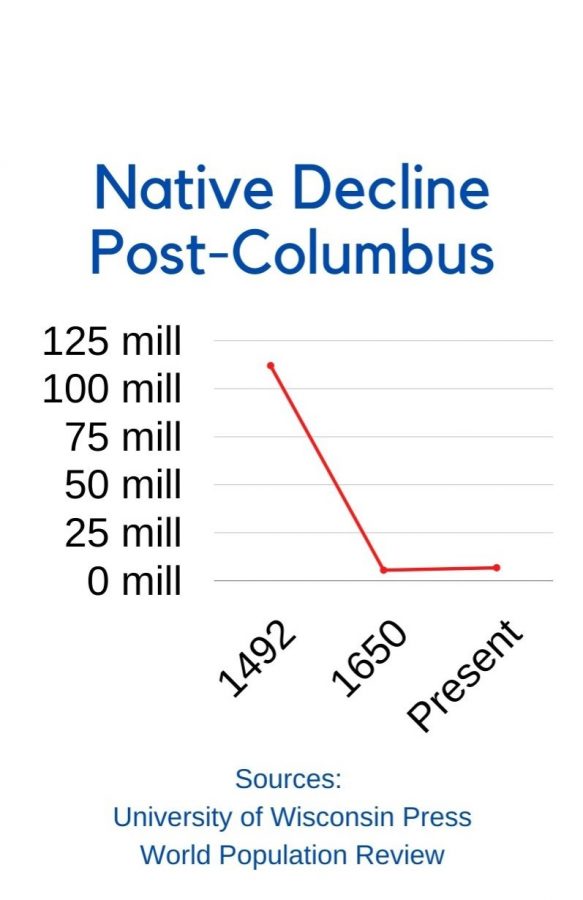The Controversy of Columbus Day
Does he deserve his own holiday?
This graph depicts the drastic decline of over 90% of the indigenous population after the arrival of Christopher Columbus.
October 12, 2020
In 1492, a man landed in American waters and proclaimed the land as his own. It didn’t matter that the land was already inhabited by millions of natives before him, Christopher Columbus still received all the credit. As far as our history books are concerned, the majority of the past is told by the white man. So if America wasn’t discovered by a white man, then it wasn’t discovered at all.
“Very little is typically taught about how the world benefited from other civilizations other than white European ones,” junior Aishwarya Suresh said. “As a result, most people don’t acknowledge the accomplishments of non-white societies and brush aside the wrongdoings of white societies.”
Although the natives had history with American soil hundreds of years before Columbus arrived, we don’t learn in-depth about the different tribes the way we did about the 13 colonies, and we don’t learn about their way of life pre-Columbus. From a moral standpoint, there’s honestly no way anyone could feel proud of U.S. origins. The U.S., at its very core, is a country built off the blood of its indigenous people. Rather than being the “founder” of U.S. territory, in reality, Columbus was simply the perpetrator of a mass genocide. According to Business Insider, approximately 90% of the indigenous population were killed by violence or disease following the arrival of Christopher Columbus. Prior to his arrival, there were about 60 million natives. Years after, only about five million remained.
“The native population today has been reduced so much that they are considered a minority,” senior Saneela Refai said. “Imagine buying a house; then someone else comes in and takes over it, claiming it as their own. That’s what happened to the natives.”
If it wasn’t ludicrous enough that Columbus was already glamorized in the textbooks, he was also granted his own holiday in the 1930s. Columbus Day is now considered a federal holiday. However, as early as the 1990s, many American natives expressed outrage towards the celebration of an explorer who violently mistreated their ancestors. With increased persistence, a number of states have begun recognizing Columbus Day as ‘Indigenous People’s Day.’
“We should be honoring indigenous Americans on Indigenous People’s Day. We should be honoring their culture, their values and their beliefs,” Refai said. “We should be mourning those that died from rape, pillage, genocide and enslavement.”
Although a handful of states have now adopted Indigenous People’s Day, on Oct. 12, the majority of U.S. states, Virginia included, will still be celebrating Columbus Day and commemorating his “achievements.” Many people simply can’t envision the beneficiary effects that changing the name of a holiday can engender.
“Changing the name means you inherently wish to change the meaning of the holiday,” Suresh said. “Changing the name would lead to future generations appreciating and understanding the struggles of the Native Americans.”
Rather than honoring the life of a man who exterminated the lives of many brave, hard-working Native Americans, all states should dedicate Oct. 12 toward celebrating and appreciating the achievements of indigenous people. America owes them so much, and it is the least we could do in their honor. At the heart of it all, America will always be the home of the Natives first.
As for Columbus, he’ll be perfectly fine without his own holiday.
“More and more states are recognizing that what we’ve always seen as the ‘discovery of America’ is actually the violation and mass murder of indigenous people on the continent,” Refai said. “States are recognizing that Columbus didn’t discover America or the Americans. They had their own language, culture and values which existed long before he arrived and exploited them.”




